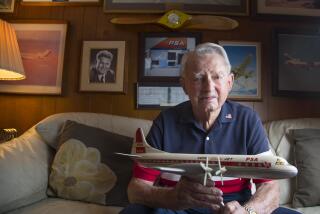President to Back Agency for Air-Disaster Victims’ Kin
- Share via
MIAMI — President Clinton’s support for the creation of a federal agency to represent survivors and families of air-disaster victims may begin to fulfill the demands of a grass-roots lobbying effort that began almost eight years ago after an explosion over Lockerbie, Scotland.
Since December 1988, when a terrorist bomb ripped through Pan Am Flight 103 and killed 270 people, victims’ advocates such as Victoria Cummock have been asking for what they call a “professional disaster manager” to represent the interests of survivors.
At the same time, advocates want to wrest from the airlines the control of the flow of information immediately after the crash.
Although Clinton did not spell out details of his proposal, announced Thursday after he met with the families of the victims of TWA Flight 800 in New York, the president indicated he would support legislation creating a family-advocate office within the National Transportation Safety Board.
“This is great. This is something every American should be entitled to. My heart sings,” said Cummock, a Miami resident whose husband, John, was among the Pan Am Flight 103 victims.
*
Cummock, who heads a group called Families of Pan Am 103 Lockerbie, met with Clinton in New York, where he spoke to families of TWA victims. She later traveled to Atlanta with the president aboard Air Force One. Clinton was to take in some of the Olympic competitions Thursday evening. “I gave him copies of proposed legislation, and he said, ‘Let’s act on it,’ ” Cummock said.
Several anti-terrorism bills are now pending before Congress, and House Transportation Committee Chairman Bud Shuster (R-Pa.) has announced plans to introduce legislation to create a family-advocate office within the NTSB.
Although the Pan Am crash gave birth to the movement for victims’ rights, the effort gained momentum after fatal commercial jet crashes last year in Indiana and Pennsylvania, and after the May 11 ValuJet crash in the Florida Everglades.
Many relatives of the 110 people killed in the ValuJet crash waited in a Miami hotel for days while searchers fought the muck and heat of the Everglades to recover fragmented remains. The wait was agonizing, and the recovery incomplete. Next week, 2 1/2 months after that crash, 53 caskets, representing those victims never identified, will be buried in a common grave in Miami.
But it was the anguish and anger of the families of the TWA crash victims that captured the world’s attention as the search for bodies in the Atlantic continued into a second week. In an emotional press conference earlier this week, many family members blasted the slow pace of the recovery effort and the misleading information given by various sources, including public officials.
They demanded, and won, a concession from the NTSB that they would be briefed on the day’s discoveries before the agency addressed the media.
“We need more organization for a disaster like this,” said Joseph Ortiz, whose niece was aboard the Boeing 747 when it exploded minutes after leaving New York for Paris on July 17. After the meeting with Clinton, Ortiz added: “I feel good that he was here. I think things are going to start happening.”
The difficulties posed by the crash site and the suspicion that a bomb caused the explosion have combined to point up an inherent conflict between the understandable needs of the victims’ relatives and the urgency of solving what may be a crime.
But the tragedy has also underscored the frustration that relatives of victims feel as they wait for news, often in a cocoon set up and controlled by the airline.
“The specific facts of this case make it unique,” said Jack Veth, an Irvine, Calif., attorney who specializes in aviation law. “Sensitivity toward the survivors is paramount.” But, he added, if terrorism is involved, the longer the delay in examining the debris for telltale clues, the less revealing and conclusive those clues are likely to be. And any terrorists who may be involved will be farther away.
Last month, appearing before a House aviation subcommittee, Cummock told horror stories of those who learned of the deaths of relatives from messages that airline personnel left on telephone answering machines. “There is no other industry in this nation where the victims and their families are left solely in the hands of the company that just killed them,” she said.
She insisted that “the care and handling of the victims should be put in the hands of disaster professionals who are trained, experienced and have no bias or conflict of interest.”
Cummock said that the NTSB, as the lead agency investigating a disaster, should have the power to call in the Red Cross, or other trained counselors, to deal with the families of air-disaster victims.
More to Read
Sign up for Essential California
The most important California stories and recommendations in your inbox every morning.
You may occasionally receive promotional content from the Los Angeles Times.













